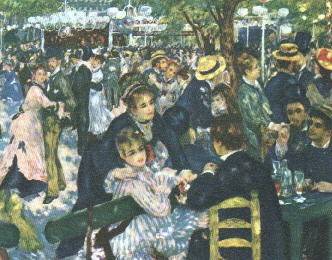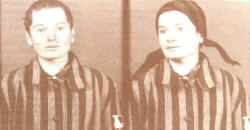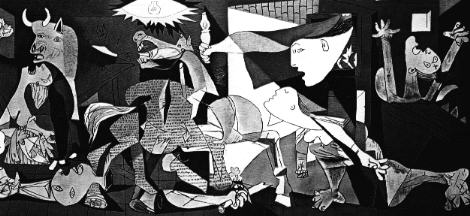

The Poem "Campo dei Fiori"
CAMPO DEI FIORI (Rescue)
In
Rome on the Campo dei Fiori
Baskets of olives and lemons,
Cobbles
spattered with wine
And the wreckage of flowers.
Vendors cover the
trestles
With rose-pink fish;
Armfuls of dark grapes
Heaped on
peach-down.
On this same square
They burned Giordano
Bruno.
Henchmen kindled the pyre
Close-pressed by the mob.
Before the
flames had died
The taverns were full again,
Baskets of olives and
lemons
Again on the vendors' shoulders. I thought of the Campo dei
Fiori
I thought of the Campo dei
Fiori
In Warsaw by the sky-carousel
One clear spring evening
To the
strains of a carnival tune.
The bright melody drowned
The salvos from the
ghetto wall,
And couples were flying
High in the cloudless sky.
At
times wind from the burning
Would drift dark kites along
And riders on the
carousel
Caught petals in midair.
That same hot wind
Blew open the
skirts of the girls
And the crowds were laughing
On that beautiful Warsaw
Sunday. Someone will read
as moral
Someone will read
as moral
That the people of Rome or Warsaw
Haggle, laugh, make love
As
they pass by martyrs' pyres.
Someone else will read
Of the passing of
things human,
Of the oblivion
Born before the flames have died.
But
that day I thought only
Of the loneliness of the dying,
Of how, when
Giordano
Climbed to his burning
There were no words
In any human
tongue
To be left for mankind,
Mankind who live on.
Already they
were back at their wine
Or peddled their white starfish,
Baskets of olives
and lemons
They had shouldered to the fair,
And he already distanced
As
if centuries had passed
While they paused just a moment
For his flying in
the fire.
Those dying here, the lonely
Forgotten by the world,
Our
tongue becomes for them
The language of an ancient planet.
Until, when all
is legend
And many years have passed,
On a great Campo dei Fiori
Rage
will kindle at a poet's word.
Warsaw, 1943
translated by Louis
Iribarne
and David Brooks
The poem was written in 1943 and it starts with a picture of the Roman square, Campo dei Fiori, a place where "they burned Giordano Bruno." In the poet's description of Campo dei Fiori, one can notice in the foreground a colorful market full of flowers, fruit and vegatables. The square is full of life and this is emphasized. In the background, lonely Giordano Bruno awaits his fate: death. This fact does not disturb the joyful atmosphere of the square. This image is linked in the poem with the portrayal of Warsaw in 1943 where in April of that year the Nazis were liquidating walled in Jewish ghetto created by them and its inhabitants. Here too, one can speak about the jaunty atmosphere. A spring evening, a clear sky, a merry-go-round, music, people in love, happy faces. However, somewhere in the background, the tragedy of the burning ghetto takes place. It is immediately obvious that these images, although they are portraying events in time and space are very similar. Nobody pays attention to the deaths of the innocent, because human tragedies (in the past as now,) including also the greatest of them, namely death, are unfamiliar to life.
What is the message of this poem? For sure, it shatter the myth of partaking in suffering, the merry crowd is not even interested in the tragedy, it is indifferent. The lyrical subject however, emphasizes the "loneliness of the dying" which is the most severe accusation of "mankind."
The loneliness of Giordano Bruno was not due to the fact that he had to die but that:
"There were no words
In any human tongue
To be left far mankind,
Mankind who live on."
"And he already distauced
As if centuries had passed."
This distance is the gulf of experience. Bruno is not able to say "Goodbye" to the living, because they are not able to accept different opinions, they are not tolerant.
Ages have passed since the death of Bruno, but humans have still not matured sufficiently to be tolerant. The Jews in Warsaw died, because the world still lacks freedom. They died a lonely death. The cause of their loneliness is not only the insensibility of the living , but also the fact that:
"Our tongue becomes for them
The language of an ancient planet."
This lines have many layers of meaning, in a literary meaning, the reference may be to Hebrew, thus a source of the loneliness of ghetto martys could be their national isolation. Another metaphorical meaning is suggested by the comparison: "Like the language of an ancient planet." Here, this reference may be to a national language, but rather to the one in which the Bible was created. The truths it proclaims sound very strange in today's world. So it would be a kind of strangeness resulting from the loss of basic Biblical truths and it is the source of both, the indifference of crowd and the loneliness of dying.
The poem ends on a note of hope and salvation: it gives notice of a rebellion opposing humanity against crimes. Poetry has the moral strength to face evil. Also from the volume "Rescue" comes the poem "A song on the end of the world."
A SONG ON THE END OF THE WORLD (Rescue)
On the day the world ends
A bee circles a clover,
A fisherman mends a glimmering net.
Happy porpoises jump in the sea,
By the rainspout young sparrows are playing
And the snake is gold-skinned as it should always be.
On the day the world ends
Women walk through the fields under their umbrellas,
A drunkard grows sleepy at the edge of a lawn,
Vegetable peddlers shout in the street
And a yellow-sailed boat comes nearer the island,
The voice of a violin lasts in the air
And leads into a starry night.
And those who expected lightning and thunder
Are disappointed.
And those who expected signs and archangels' trumps
Do not believe it is happening now.
As long as the sun and the moon are above,
As long as the bumblebee visits a rose,
As long as rosy infants are born
No one believes it is happening now.
Only a white-haired old man, who would be a prophet
Yet is not a prophet, for he's much too busy,
Repeats while he binds his tomatoes:
There will be no other end of the world,
There will be no other end of the world.
Warsaw, 1944
translated by Anthony Milosz
"A song..." may be understood differently, because it touches different contexts. The text refers to visions of St. John the Divine and it interprets their metaphysical sense. Besides the motifs of extermination and catastrophe appeared many times in poet's early texts.
"A Song..." can be treated then as a continuation and negation of catastrophism. The poem was written during the war and it can be also analyzed in this context. It may be noticed that this seemingly simple text is "a factory of cultural senses" (J.Błonski).
This page, in its earlier 1997 version (use right mouse to open in new window), was created by Aleksandra Kolodziejczyk, Iwona Kowalska, and Dariusz Plygawko, students of the Fifth General Education Liceum in Bielsko-Biala. Marcin Tomana and Piotr Kowalski of the School's Informatics faculty and Urszula Zajaczek of the Polish Language faculty, acted as advisors. Linguistic editing of current version by Agata Dybel and Peter K. Gessner.
| Info-Poland a clearinghouse of information about Poland, Polish Universities, Polish Studies, etc. |
